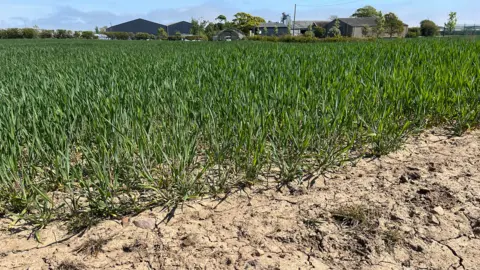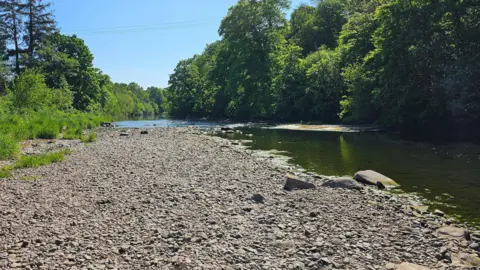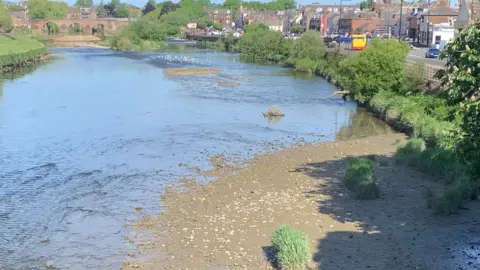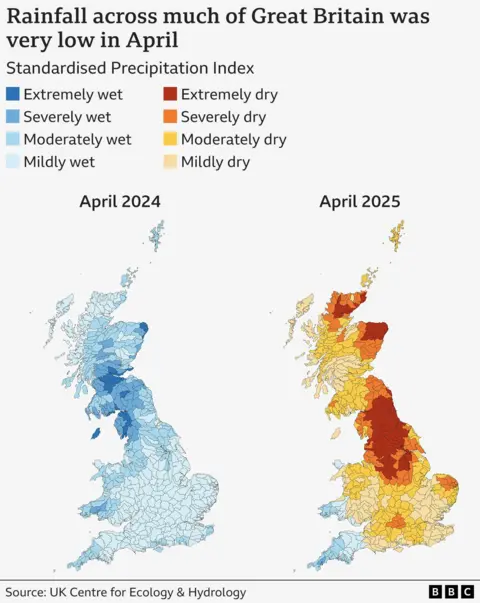Scottish Water warning after driest period in 60 years
 BBC Weather Watchers, Mr McC
BBC Weather Watchers, Mr McCScottish Water has warned customers to use supplies sparingly after the driest start to the year since 1964.
People should take shorter showers and avoid using hoses - though it stopped short of calling for a full hosepipe ban.
The firm said Scotland had been using around an extra 150 million litres of water a day since the middle of April.
It comes after environment agency Sepa said 23 areas surrounding major bodies of water - including the Clyde, Dee, Firth of Forth and Firth of Tay - were now experiencing some level of water scarcity.
A number of areas, including Potterton near Aberdeen, Turnberry in South Ayrshire and Balfron in west Stirlingshire are having normal water supplies supplemented by tankers.
In Moray, borehole supplies from the River Spey are being boosted by pumping water directly from the river to maintain normal levels.
Scottish Water estimate that reservoir levels in some parts are up to 10% lower than average.

Forecasters do not expect rainfall in Scotland for another week, until at least 22 May.
Guidance offered by Scottish Water includes taking shorter showers and turning the tap off when brushing teeth.
It recommends using washing machines and dishwashers only when fully loaded and using a bucket and sponge rather than a hose to wash cars.
Scottish Water said a large part of additional water use was in gardens.
People are advised to use a watering can instead of a garden hose and avoid using sprinklers.
The last time a full hosepipe ban was implemented in Scotland was 1995.
 BBC Weather Watchers, Campbelly
BBC Weather Watchers, Campbelly
Alex Plant, Scottish Water's Chief Executive, told BBC Radio's Good Morning Scotland programme that there was "good resilience" in the water supply.
He said a hosepipe ban remained "some way off", but said it was measure that could be considered.
He said: "We think about it being wetter here that in other parts of the UK, and of course it is but were not immune to these changing weather patterns and we all need to just think a bit differently about it."
"At the moment the average person in Scotland uses about 40% more water than the average person in Yorkshire, that's not a sustainable position."
Mr Plant said "simple steps" would help maintain normal supplies, saying Scotland's climate as a whole is changing.

The sustained dry weather is having an impact on agriculture across Scotland during the growing season.
John Brown, a farmer from East Neuk in Fife, said he is already having to tap into extra water supplies which he wouldn't normally need until July.
He said: "At this time of year we're busy establishing crops and unfortunately the crop is just too dry.
"We need to irrigate and get these crops growing otherwise we're not going to have the yield or quality that our customers require."
Like many farmers, John has a license that allows him to take water from a local burn for use on his farm, where he grows broccoli, strawberries and potatoes.
He said farmers have always had to deal with challenges brought by the weather, but "the extremes of the weather are the new challenge".
"We are getting longer periods of wet weather and longer periods of dry weather and we've got to mitigate against those extremes," he added.

From January to April the country had only 59% of its long-term average rainfall, with May's figures on track to be even lower.
On Tuesday temperatures in parts of Scotland rose above 25C, making it the hottest day of the year so far.
The UK as a whole is currently experiencing its driest spring conditions for 130 years.
Scotland's driest spring on record was in 1852, when an average of 108.4mm of rain was recorded.
The last week of May is expected to bring a change in conditions, with high pressure losing its strong-hold and Atlantic weather systems moving in.

It's incredibly early in the year to start talking about restricting our water use but with the dry weather having been with us now for about a month, it's no surprise.
And we're not expecting any significant quantities of rain to fall for another week at least.
But talk of a hosepipe ban may be premature; it needs to be approved by a minister and that hasn't ever happened since devolution. Scotland's last hosepipe ban was in 1995.
Generally speaking, water is in much greater abundance in Scotland compared with the south-east of England, where hosepipe bans are used fairly frequently, the last coming in 2023.
But because there's water, water everywhere, we are more free and easy with it. The average Scot is using 178 litres a day compared with 137 litres in England and Wales.
The advice? Slow down. And treat water much more like a precious resource by limiting our hosepipe use and not letting it drain down the plug hole unnecessarily.
